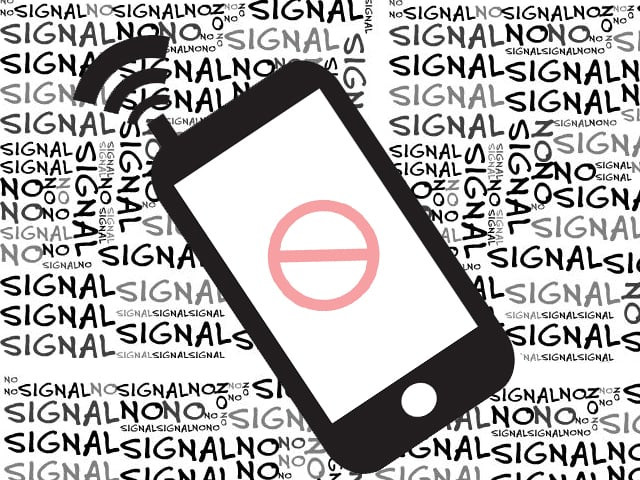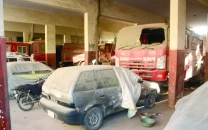Dark Ages: Karachi, Quetta face 8-hour cellular blackout
Losses to the tune of Rs2 billion were estimated by the business community, due to cellular blackout.

In a move that seems to have now become a norm rather than an exception, cellular networks were suspended in Karachi and Quetta on Friday for eight hours following a notification by the interior ministry in an effort to thwart terror attacks in sensitive areas.
The suspension of services, which began at 10am and ended at 6pm, resulted in widespread criticism from all quarters that were adversely affected. Given the sensitivity of the month, services are likely to remain intermittently suspended for the first ten days of Muharram.
However, the government may yet have to justify the move in court. A petition was filed in Sindh High Court on Friday, pleading the court to declare the suspension of cellular services by the interior ministry illegal. Judges directed the office to fix a hearing for the petition on Saturday so that an appropriate order could be passed.
“We had intelligence reports about (the) possibility of a very big terrorist attack in Karachi and it was because of this reason that the mobile phone service was shut down,” senior police official Javed Odho told AFP. “It is a preventive measure taken to effectively counter the terrorism threat,” he said.
The ban affected the business community in particular, which uses cellular services as a key means of communication. Speaking with The Express Tribune, chairman All Karachi Tajir Ittehad Atiq Mir criticised the decision, saying, “cell phones have become our basic source of contact.”
Almost 90% of business activities in the commercial hub of the country came to a standstill on Friday due to the suspension of cellular networks by the interior ministry. Losses to the tune of Rs2 billion were estimated by the business community.
“Such decisions hurt business activities in the city and bear no results as people have been killed despite the ban on cellular networks. I don’t know who gives them such advice,” he added.
Chairman Consumers Rights Association Kokab Iqbal also criticised the suspension of cellular networks and said that the government should take steps to register mobile SIMs rather than suspending cellular services across the board. Iqbal said that, due to the suspension, people spent the entire day in “mental torture” as they could not contact their family members who leave for work in the morning, adding that the unstable situation in the city demands one to be in regular contact with family.
Quetta
Though the situation was bad in Karachi, it was worse for Quetta. Not only were cellular services suspended, motorcycles were also banned from the streets.
Unlike the suspension of the ban in Karachi by the Sindh High Court, Quetta saw the sweeping ban on two-wheelers enforced. Despite the Chamber of Commerce and Industry in Quetta challenging the decision, it was not overturned.
The ban mostly affected students, who endured great difficulty in reaching their schools and colleges. It took effect from 6am and forced various educational institutions to be shut down for the day.
Student Abdul Waheed told The Express Tribune that the government had failed to control the law and order situation and target killings in the city. “The government is busy creating trouble for the people,” he said. “They should arrest the culprits who are violating the law and killing innocent people.
Meanwhile, Quetta had more heartache with the government’s announcement that a ban on pillion riding would be extended for two months.
(WITH ADDITIONAL REPORTING BY MOHAMMAD ZAFAR IN QUETTA)
Published in The Express Tribune, November 17th, 2012.



















COMMENTS
Comments are moderated and generally will be posted if they are on-topic and not abusive.
For more information, please see our Comments FAQ